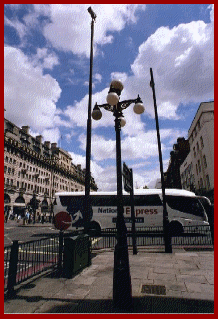| ||||||||||||||||||||||||||||||
Welcome to the | ||||||||||||||||||||||||||||||
 | ||||||||||||||||||||||||||||||
 | ||||||||||||||||||||||||||||||
Time Lapse, VCR's, DVR's, NVR's ... | ||||||||||||||||||||||||||||||
Now given that most hard disc Digital machines are capable of recording far more information (data), than an analogue tape based machine, you would think that was a huge advantage. At this particular stage of development, it does actually create something of an operational problem. If you consider that the vast majority of security applications require high quality recordings to be made and stored for "an appropriate period of time", for what are quite obvious reasons. Many crimes are committed after the suspect has previously visited the scene, or indeed in the case of street crimes, or vehicle related offences, the individuals involved often frequent the same establishments and locations. So working on the principle that one incident may well relate to a number of previous visitations, it’s essential for an investigating officer to be able to go back over previous recordings, to locate perhaps clearer and more easily identifiable recordings of the suspects. It’s at this stage that the whole concept of Digital recorders starts to get ever so slightly complicated. You will recall that like analogue tape machines, a Digital recorder can be set to record at different speeds; but unlike VHS or S-VHS the DVR can also be programmed to record at a specified resolution. Now on the basis that 'digital' technology is being marketed as providing significant quality improvements over those rusty old cassette machines, common sense dictates that unless the resolution is set to S-VHS equivalent or better, then the overall picture quality would not in itself justify the significant difference in purchase price. Admittedly DVR's offer a number of unique features which are not available with the older analogue machines, but to be fair, these added features are really only an advantage, if you actually need to use them (more about this later). On the assumption that a Digital recorder might be set to record at the same resolution and the same capture rate as an S-VHS machine (at or around 400 lines per frame, just over 3 images per second ), with a 160Gb hard disc drive, depending on changes in the image and the compression technique used, it may actually be capable of recording for (approximately) perhaps 7-10 days, against the analogue S-VHS machine which would be one day per tape ..... Now we begin to hit the problem zone. Most analogue tape systems are set to record for perhaps 24 Hours, and then the tape is replaced each day, with the previous 14 or 30 days tapes set aside awaiting re-use. | ||||||||||||||||||||||||||||||
 | ||||||||||||||||||||||||||||||
IMPORTANT: No material may be reproduced, copied or redistributed from this site, © doktorjon.co.uk 2004 - 2008 Homepage...:...Gateway...:...Technical Gateway....:....Quickfind Index....:....Equipment Directory | ||||||||||||||||||||||||||||||

